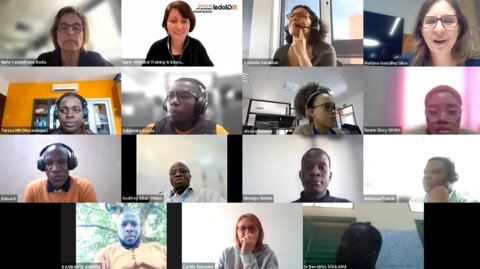Building research capacity through PAMAfrica

Since the beginning of the PAMAfrica grant, we have facilitated various targeted workshops in support of our goal of strengthening research capacity at trial sites and the research capabilities of the next generation of African scientists from partnering institutions. Part of our Work Package 4 ambitions, these workshops also ensure that patients receive optimal care and that studies are implemented to the highest quality standard.
The PAMAfrica Consortium has already facilitated workshops on topics like site quality management systems, GCP/GCLP certification, training for Ethic Committee members and Health Authorities, scientific research management, microscopy training for site personnel working on the severe malaria WP3 KARISMA trial, and most recently, science writing. In total, 622 people have taken part in these workshops, with women representing 35% of all participants. The recent training on science writing was open to participants from the SINDOFO Consortium with the aim of creating synergies between the two consortia, who have several partners in common.
Held from 2 May to 9 June, the 30-hour online science writing course was geared toward research professionals whose work regularly includes science writing for different audiences, including grant proposals, manuscripts for peer-reviewed journals, and scientific content adapted for policymakers and the general public. As part of the workshop, participants analyzed a selection of writing examples and were given the opportunity to optimize a piece of their own written work. Overall, the training was very well received and attended, with a few key takeaways to enhance the quality and structure of similar initiatives in the future.
ISGlobal conducted a participant selection process to ensure the training was delivered to a relatively small group of motivated participants, which included 10 from PAMAfrica and five from the SINDOFO Consortium. Considering the high level of interest in this training, a decision was made to split it into two sessions; the first was for beginners and a second edition will be offered for more advanced participants next year.
Georges Somé, a PAMAfrica MSc student in Epidemiology and Biostatistics at the University of Witwatersrand (South Africa) and participant in the science writing course, saw it as a valuable initiative for himself and others pursuing a career in research. “The science writing course taught us how to develop effective scientific work through the common characteristics of good scientific writing, how to optimize our writing and how to adapt it to engage with various audiences,” he said. “Moreover, the practical sessions on scientific writing were very beneficial in terms of my personal skills development.”
Additional workshops are set to take place between now and the end of the PAMAfrica grant, including advanced versions of previous sessions.